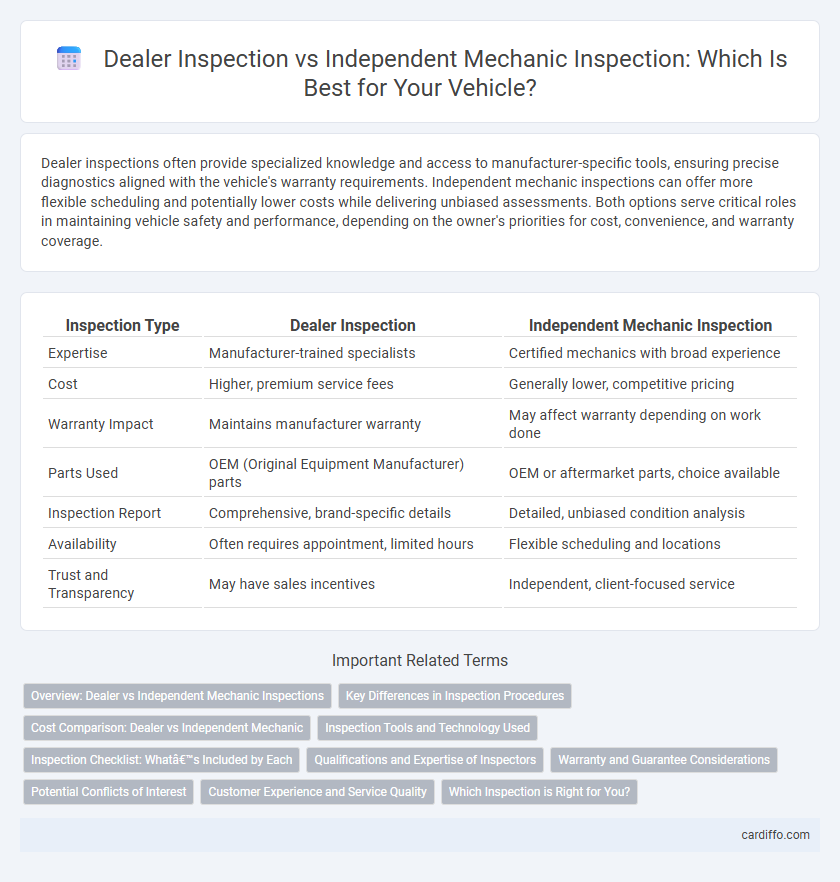Dealer inspections often provide specialized knowledge and access to manufacturer-specific tools, ensuring precise diagnostics aligned with the vehicle's warranty requirements. Independent mechanic inspections can offer more flexible scheduling and potentially lower costs while delivering unbiased assessments. Both options serve critical roles in maintaining vehicle safety and performance, depending on the owner's priorities for cost, convenience, and warranty coverage.
Table of Comparison
| Inspection Type | Dealer Inspection | Independent Mechanic Inspection |
|---|---|---|
| Expertise | Manufacturer-trained specialists | Certified mechanics with broad experience |
| Cost | Higher, premium service fees | Generally lower, competitive pricing |
| Warranty Impact | Maintains manufacturer warranty | May affect warranty depending on work done |
| Parts Used | OEM (Original Equipment Manufacturer) parts | OEM or aftermarket parts, choice available |
| Inspection Report | Comprehensive, brand-specific details | Detailed, unbiased condition analysis |
| Availability | Often requires appointment, limited hours | Flexible scheduling and locations |
| Trust and Transparency | May have sales incentives | Independent, client-focused service |
Overview: Dealer vs Independent Mechanic Inspections
Dealer inspections often provide comprehensive checks using manufacturer-specific diagnostic tools and genuine parts, ensuring that vehicles meet factory standards. Independent mechanic inspections typically offer more flexible pricing and personalized service, with experienced technicians able to identify issues outside of standard factory parameters. Comparing dealer versus independent inspections involves weighing manufacturer expertise and warranty considerations against cost efficiency and tailored service options.
Key Differences in Inspection Procedures
Dealer inspections typically follow manufacturer-specific protocols using proprietary diagnostic tools, ensuring alignment with warranty requirements and brand standards. Independent mechanic inspections offer greater flexibility, often employing a broader range of diagnostic equipment and emphasizing personalized assessment tailored to the vehicle's condition. Differences also include the scope of inspection; dealers focus on compliance with factory guidelines, while independent mechanics provide comprehensive checks that may uncover issues outside standard manufacturer criteria.
Cost Comparison: Dealer vs Independent Mechanic
Dealer inspections often come with higher costs due to brand-specific expertise, specialized tools, and OEM parts, typically ranging between $100 and $250. Independent mechanic inspections generally cost less, averaging around $75 to $150, while offering flexible services and often providing more personalized attention. Choosing between the two depends on budget constraints and the value placed on brand-specific knowledge versus cost-efficiency.
Inspection Tools and Technology Used
Dealer inspections utilize advanced diagnostic equipment integrated with manufacturer-specific software, ensuring precise detection of vehicle issues aligned with warranty standards. Independent mechanics often rely on versatile, multi-brand diagnostic tools that can identify a broad range of problems but may lack access to proprietary systems. The choice of inspection tools directly impacts the accuracy and depth of vehicle assessments, influencing repair recommendations and overall service quality.
Inspection Checklist: What’s Included by Each
Dealer inspections typically include manufacturer-specific diagnostic tests, warranty-related item checks, and use proprietary software to ensure all systems comply with factory standards. Independent mechanic inspections focus on a comprehensive evaluation of vehicle safety, engine condition, brakes, suspension, and fluid levels, often using general diagnostic tools and personalized expertise. Both inspect exterior, interior, and undercarriage conditions, but dealer inspections emphasize compliance and software updates while independent inspections prioritize overall vehicle health and cost-effective maintenance advice.
Qualifications and Expertise of Inspectors
Dealer inspections are performed by factory-trained technicians with specialized knowledge of specific vehicle brands, ensuring detailed diagnostics using proprietary tools and access to manufacturer updates. Independent mechanic inspections offer a broader range of expertise across multiple makes and models, often bringing years of diverse experience and personalized service at competitive rates. The qualifications and certification standards of inspectors directly impact the accuracy and reliability of inspection results, influencing buyer confidence and vehicle maintenance outcomes.
Warranty and Guarantee Considerations
Dealer inspections often come with the advantage of maintaining warranty coverage, as they follow manufacturer-recommended procedures and use genuine parts, ensuring compliance with warranty terms. Independent mechanic inspections may offer more flexible and potentially lower-cost evaluations but could risk voiding warranties if non-approved parts or methods are used. Understanding warranty and guarantee stipulations before choosing between dealer or independent inspections is critical to protect your vehicle investment.
Potential Conflicts of Interest
Dealer inspection reports may present potential conflicts of interest, as dealers have a financial incentive to recommend costly repairs or services that benefit their business. Independent mechanic inspections offer a more objective evaluation since these professionals operate without dealership affiliations, ensuring unbiased assessments of the vehicle's condition. Selecting an independent mechanic inspection reduces the risk of inflated repair estimates and promotes transparency in vehicle transactions.
Customer Experience and Service Quality
Dealer inspections often provide a comprehensive evaluation with manufacturer-trained technicians using OEM parts, ensuring service quality aligned with brand standards. Independent mechanic inspections can offer personalized customer experiences through flexible scheduling and potentially lower costs while delivering unbiased assessments. Choosing between the two depends on priorities such as warranty protection, thoroughness of inspection, and the level of individualized service desired.
Which Inspection is Right for You?
Dealer inspections offer specialized expertise with manufacturer-specific tools and genuine parts, ensuring accurate diagnostics and warranty compliance. Independent mechanic inspections provide cost-effective, unbiased evaluations with flexibility in service options and often faster appointment availability. Choosing the right inspection depends on your vehicle's warranty status, budget, and preference for specialized versus personalized service.
Dealer inspection vs independent mechanic inspection Infographic

 cardiffo.com
cardiffo.com